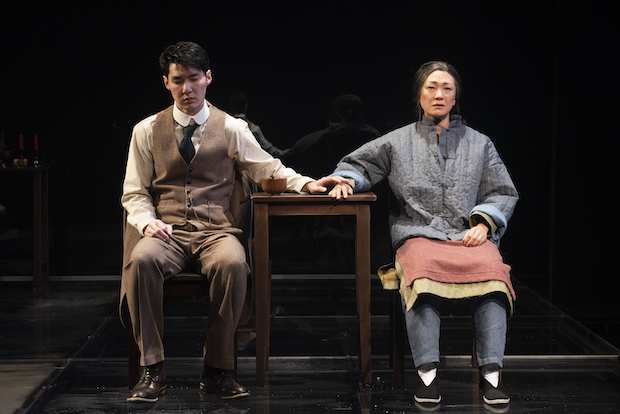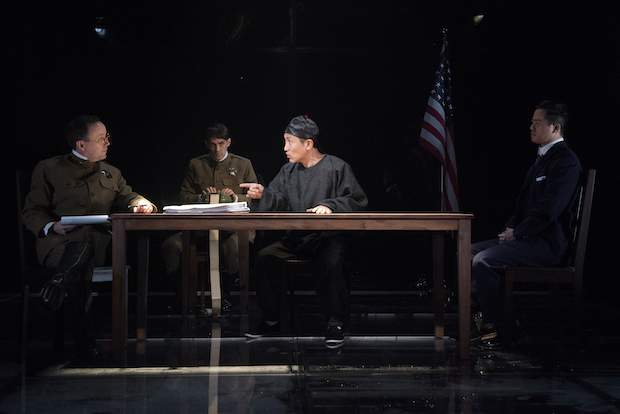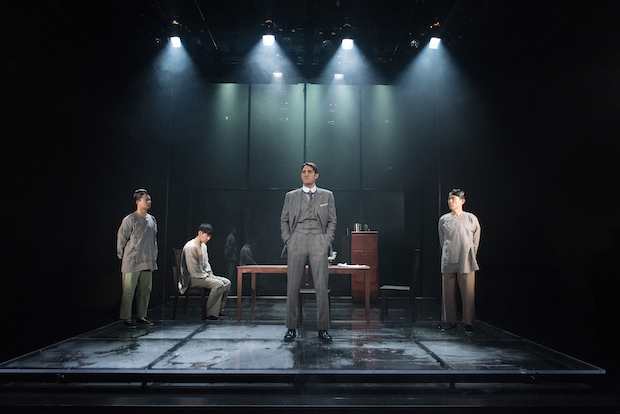Review: Chinese Immigrants Do What Is Necessary to Make It to The Far Country
Lloyd Suh’s historical play makes its world premiere with the Atlantic Theater Company.

(© Ahron R. Foster)
The Far Country is the second play by Lloyd Suh to be produced in New York City this year after The Chinese Lady at the Public Theater back in the spring. Both productions — this latest one a world premiere with the Atlantic Theater Company — come amid a rise in violence against Asian Americans, especially since the Covid pandemic started. So there's certainly a topical value to plays like Suh's that remind us of America's shameful past of Asian American bigotry. But in The Chinese Lady and parts of The Far Country, Suh also evinces a poetic sensibility that occasionally offsets his underlying didactic impulses.
The 1882 Chinese Exclusion Act provides the backdrop for The Far Country, which details the lengths Chinese people went in order to get around the legislation. In its first scene, set in San Francisco in 1909, we are introduced to Gee (Jinn S. Kim) amid a battery of questions from two American immigration officials (Ben Chase and Christopher Liam Moore) in 1909 San Francisco. Though he says he was born in the US, in the next scene, set a year later in the Taishan region of China, Gee, approved for citizenship, reveals that much of what he told the officials was a fabrication. He is also planting the seeds for bringing Moon Gyet (Eric Yang), the son of Low (Amy Kim Waschke), to the US.
To have a chance at staying in the States, however, Moon Gyet would have to pretend to be Gee's son while working for him at a laundromat, thus furthering a cycle of indentured servitude that Low initially chafes at. Moon Gyet would also have to memorize an entire detailed, invented backstory for the immigration officials — thus setting up the play's electrifying third scene, in which an immigration inspector (also Chase) pokes and prods at Moon Gyet's history in an attempt to expose its falsity.

(© Ahron R. Foster)
Are such perils worth the risks that Gee, Moon Gyet, and many other Chinese take for the sake of a potentially better life here? That question runs throughout The Far Country. While Gee and Moon Gyet willingly accept the consequences of their actions, Low worries about the loss of cultural and personal identity that might result. Perhaps, though, as a later scene between Moon Gyet and another aspiring immigrant in Taishan named Yuen (Shannon Tyo) suggests, the hazards are worth braving less for themselves than for future generations.
As a history lesson, The Far Country is enlightening, sobering, even at times enraging. As drama, Suh's play is on shakier ground. Viscerally speaking, the first half packs more of a punch than its second, with that aforementioned third scene setting the stage alight with dramatic tension, gripped as we find ourselves hoping that Moon Gyet doesn't inadvertently trip up against the inspector's rigorous line of questioning. And while its second half is rarely less than thoughtful, nothing in it ever quite matches the haunting poetry of the concluding sequence of its first half, in which Suh strikes a surreal note in dramatizing what he describes in his script as "a liminal space": the purgatorial state of being stuck on the Bay Area's Angel Island awaiting a decision on citizenship.
That scene also shows director Eric Ting's production at its most imaginative. Fan Zhang's sound design and music in particular infuses the scene with an appropriately tentative, disquieting feel. Otherwise, Jiyoun Chang's stark lighting design and Clint Ramos's generally austere set design, with black being the dominant color onstage, give the play a somewhat clinical feel — appropriate in bringing to life a world in which people are forced to adopt a transactional mindset in order to achieve a larger goal.

(© Ahron R. Foster)
There's nothing chilly or artificial about the performances, however. As Gee, Kim has arguably the most difficult role, having to exude both sincerity and calculation at the same time — a task that he pulls off effortlessly. Eric Yang brings similar sensitivity and nuance to Moon Gyet, whose innocent exterior belies a street-smart side. Yang's scene with Shannon Tyo, as the similarly resourceful Yuen, suggests a genuine meeting of temperaments that makes their eventual union feel convincing.
Most moving of all, though, is Amy Kim Waschke as Low, who realizes the necessity of her son's sacrifices but hates the vicious cycle into which he's forced. In some ways, Low is the spiritual center of Suh's uneven but worthwhile play, which, like the character herself, trembles with a sense of sorrow about what the Chinese had to go through to subvert legislated racism.











